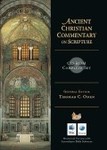Last week, I read a blog post which called for Christian theologians to focus anew on articulating the doctrine of the Trinity in response to recent challenges. In recent years, many Christians from non-liturgical traditions have shown renewed interest in more liturgical forms of worship. Modern society’s can’t-stop-for-breath pace has many people looking for ways to achieve greater simplicity, a deeper sense of community, a more thoughtful spirituality, and a more profound appreciation of the sacred. These are all areas where contemporary Christians can benefit from greater familiarity with the early church fathers. After all, they were the ones who first articulated Christianity’s central teachings, established the church’s liturgical practices, and wrestled with how best to live out their faith in the world.
Of course, the challenge of looking to the early fathers for guidance is knowing where to begin. The most familiar collection of their writings is a whopping 38-volumes! Few of us have the time or wherewithal to work our way through that body of literature systematically, and while Accordance’s powerful search capabilities now make it easy to explore, it can still feel like you’re visiting an alien world of unfamiliar people and ideas.
 Thankfully, there are now some helpful resources to guide you in your discovery of the early church fathers. Not long ago, I blogged about the Ancient Christian Commentary on Scripture (ACCS), which arranges excerpts of patristic teaching into a running commentary on the text of the Bible. I compared the experience of reading this commentary to “attending a group Bible study and listening to the interplay of different perspectives.” Consult this commentary a few times and you’ll come to admire the fathers’ Scriptural knowledge and exegetical skill—even if you don’t always agree with their take on a passage.
Thankfully, there are now some helpful resources to guide you in your discovery of the early church fathers. Not long ago, I blogged about the Ancient Christian Commentary on Scripture (ACCS), which arranges excerpts of patristic teaching into a running commentary on the text of the Bible. I compared the experience of reading this commentary to “attending a group Bible study and listening to the interplay of different perspectives.” Consult this commentary a few times and you’ll come to admire the fathers’ Scriptural knowledge and exegetical skill—even if you don’t always agree with their take on a passage.
The ACCS can give you various fathers’ commentary on specific passages of Scripture, but two brand new resources offer a more topical introduction to the fathers.
 Learning Theology with the Church Fathers, by Christopher Hall, offers a fascinating look into how the church fathers wrestled with the difficult theological controversies of their day. I started reading it the other day and frankly couldn’t put it down. Hall goes beyond merely discussing historical theology; he manages to reveal the principle motivations and concerns of the people involved. The result is that one begins to see them not as esoteric philosophers discussing obscure points of theology, but as dedicated pastors who felt compelled to articulate what they understood to be the teaching of the apostles and of the Bible. In short, they become more human, and far more three-dimensional.
Learning Theology with the Church Fathers, by Christopher Hall, offers a fascinating look into how the church fathers wrestled with the difficult theological controversies of their day. I started reading it the other day and frankly couldn’t put it down. Hall goes beyond merely discussing historical theology; he manages to reveal the principle motivations and concerns of the people involved. The result is that one begins to see them not as esoteric philosophers discussing obscure points of theology, but as dedicated pastors who felt compelled to articulate what they understood to be the teaching of the apostles and of the Bible. In short, they become more human, and far more three-dimensional.
Worshiping with the Church Fathers, written by the same author, does much the same thing with respect to worship, prayer, and the sacraments. I haven’t read as much of this one yet, but Hall’s discussion of “the sacramental mysteries” in Chapter One is extremely helpful, not only for understanding the fathers, but also for understanding the way various Christian traditions differ in their view of the sacraments. After the sacraments, Hall turns to the fathers’ teaching on prayer and personal discipline. The latter section deals with the desert fathers and early monastic movements, and from the bits I’ve skimmed looks absolutely fascinating.
In both of these books, Hall acts as a guide to the early fathers, helping modern readers understand where those early Christians were coming from. Hall is an effective guide precisely because he himself does not come from a tradition which places much emphasis on church history. As he puts it in Learning Theology with the Church Fathers:
The model of exegesis I had received and practiced as a young Christian was a highly individualistic affair. … I was shockingly unaware of the Christians who had read, pondered and interpreted these texts before me.
In other words, because Hall understands the assumptions of those who know little about the fathers, he does an excellent job of communicating the fathers’ importance in a way they can understand and appreciate.
As you can see, I’m pretty excited about these resources. The contemporary church can learn much from the early church, and these new resources make it easier than ever to do so.
If you’d like to begin exploring the early church fathers yourself, all the resources I’ve just mentioned are on sale from now through March 15th. Be sure to take advantage of the discounted prices.


